
Aerospace America – July-August 2020
English | 68 pages | pdf | 14.9 MB
Here in the United States, school children learn about Manifest Destiny, the 19th-century belief of many Americans that they were destined, by God in some interpretations, to expand westward.
The reality is that this destiny did not unfold as smoothly, fairly or peacefully as it might have. There were technical innovations, but also snake oil salesmen. There was Sacagawea, but also genocide. There were international alliances but also war; there was environmental waste, but also awakening.
So, here we are at a similar junction. This time the United States and a host of space-faring societies are eyeing expansion into space, and no longer just for exploration. Plans call for factories, mining operations, outposts for scientists and tourists, even colonies in the boldest visions.
We still have a chance to avoid carrying our darkest sides into this vacuum, but that’s going to take ideas, insights and lots of frank discussion. Some matters to be sorted will be weighty; others will be wonkish. Taken together, they can add up to something large: Humanity’s peaceful expansion into space.
Aerospace America Magazine wants to be part of the search for solutions. As a starting point, we invite you to open the back cover of this issue, where you’ll fi nd the inaugural column by astrodynamicist and space environmentalist Moriba Jah, who will explore topics related to humanity’s expansion into space. Moriba’s columns will spring from his life and career experiences. He was born in San Francisco to a mother from Haiti and a father from Sierra Leone. He spent his formative years in Venezuela, and moved back to the United States, earning a doctorate in aerospace engineering science from the University of Colorado in Boulder. At NASA’s Jet Propulsion Lab in California, Moriba helped navigate the Mars Odyssey spacecraft and the Mars Reconnaissance Orbiter. At the U.S. Air Force Research Laboratory sites in Maui and New Mexico, he helped elevate issues of space situational awareness to a major research focus and chaired a NATO discussion about the topic. He now lives in Texas, where he is an associate professor at the University of Texas at Austin and is an AIAA fellow.
We expect Moriba’s columns to serve as a catalyst for commentary articles from other authors and to inspire enterprising reporting. The net result will be a rich variety of views and information in this magazine, all grounded firmly in facts and science as humanity examines whether and how to become extraterrestrials. ★
Download from: